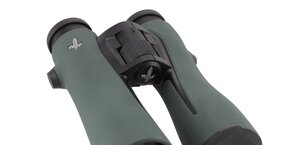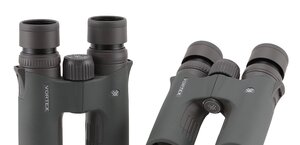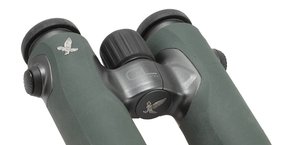The Discovery WP series consists of two very small and physically light roof prism binoculars with the following parameters: 8x42 and 10x42. The tested binoculars was actually the smallest instrument here with the height amounting to just 126 mm.
This series’ instruments are waterproof, nitrogen-filled and they feature BaK-4 glass prisms. All air-to-glass surfaces were covered by antireflection multilayer coatings.
Distribution / Sales:
Olbrycht Trade sp. z.o.o.
web site
| Magnification |
Lens diameter |
Angular field of view |
Prisms |
Eye relief |
Weight |
Price |
| 10 |
42 |
87/1000(5o) |
BaK-4/roof |
18 mm |
682 g |
1050 PLN |
|
|
| Real front lens diameter |
Left: 41.7+/-
0.05 mm
Right: 41.8+/-
0.05 mm
|
7 / 8.0 pkt |
| Real magnification |
10.2+/-
0.2x
|
3/3.0 |
| Transmission |
66+/-
3%
|
4.5/25.0 |
| Chromatic aberration |
Slight. |
6/10.0 |
| Astigmatism |
Medium. |
5.6/10.0 |
| Distortion |
The distance of the first curved line from the filed centre compared to the field of vision radius: 60% +\- 8% |
7/10.0 |
| Coma |
Distinct. |
3.8/10.0 |
| Blurring at the edge of the FOV |
The blur occurs in the distance of 83% +\- 3% from the field of view centre. |
6/10.0 |
| Darkening at the edge the FOV |
Very low. |
4.4/5.0 |
| Whiteness of the image |
Light grey-pink. |
4.1/5.0 |
| Collimation |
Perfect. |
5/5.0 |
| Internal reflections |
| Left: |
Right:
|
 |
 |
Noticeable. |
3.6/5.0 |
| Housing |
Very small. Stinking rubber on the casing. The eyecups twist up but are too short. A lot of grease. Solid, comfortable to hold. |
6.3/8.0 |
| Focusing |
Central screw is convenient, the individual focusing on the right eyepiece – not so. Everything moves inside. |
4.3/5.0 |
| Tripod |
The exit is not very comfortable. |
2.5/3.0 |
| Interpupilary distance |
from 57.2 to 74.2mm
|
5/6.0 |
| Closest focusing distance |
1.15 m. |
2/2.0 |
| Eyepieces FOV |
Apparent field of view of 48.8 deg (according to simple formula) and 46.2 deg (according to tangent formula). |
3/20.0 |
| Field of view |
Measured by us amounted to 4.79 +\- 0.03 degrees and it was by 0.21 degree narrower than in specifications. A very narrow field of view for this equipment class. |
4/8.0 |
| Quality of the interior of the barrels |
Dark but shiny. Scratched bottom. A lot of specks of dust. |
3/5.0 |
| Vignetting |
| Left: |
Right:
|
 |
 |
OL: 0.0%, OP: 0.6%. |
7.5/8.0 |
| Prisms quality |
Good quality BaK-4. |
8/8.0 |
| Antireflection coatings |
Green-purple everywhere. Medium intensity. |
4.5/5.0 |
| Warranty [years] |
5 |
3.5/6.0 |
| Final result |
59.8%
45th place in the overall ranking of the 10x42 binoculars’ test. |
113.6 / 190 pkt
|
| Econo result |
34th place in the econo ranking of the 10x42 binoculars’ test. |
-0.6pkt. |
Summary
Pros:
- solid and compact casing,
- slight distortion,
- chromatic aberration quite well corrected,
- very low brightness loss at the edge of the field,
- sharp image already from the distance of 1.15 metres!
- good quality of prisms.
Wady:
- very narrow field of view,
- low transmission,
- average blackening inside the barrels,
- significant coma,
- not very fragrant rubber on the casing.
Once again the price is not adequate to the possibilities. If only the Opticron Discovery cost 100-200 USD it would be able to compete successfully with such binoculars as the Vortex Crossfire, the Vortex Sidewinder or the Delta Optical Forest and it would be also one of our favorites in the lowest price segment. Seeing the price tag around 300 USD we might start to get interested in other instruments which fared much better and have a wider field of view ( like the Ecotone AD-7, the Vixen Apex Pro, the Eschenbach sektor D compact 10x42 B or the Swift Ultralite).

















